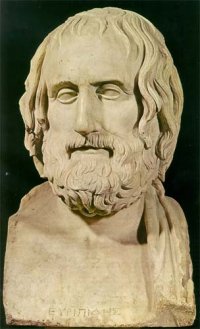More People of Greece
More Topic Categories
Related Destinations
Euripides (~-480 - ~-406)
 Euripides was an Ancient Greek tragedian and one of the three great Athenian drama playwrights of ancient Greek theatre.
Euripides was an Ancient Greek tragedian and one of the three great Athenian drama playwrights of ancient Greek theatre.He was born in Salamis around 480 BC; it is said that his birth day coincided with the great Naval Battle of Salamis. He lived during an era of prosperity, as this was the famous Golden Age of Pericles. He occupied himself with painting, philosophy, poetry and music. He loved the sea, which played an important role in his work. He had very few friends, as he was antisocial, introvert, melancholic and distant. He was never interested in politics; instead, he had a profound interest in the cultural movement of enlightenment.
Through his plays, he managed to trouble people because of his unique perspective and courageous decisions; the tragedy “Helen” is characterized by unprecedented for the time elements, as Euripides gave the floor to “mute” roles, such as the slave. He also questioned everything, including the existence of the Gods, without himself being an atheist.
He did not have a happy personal life; he divorced his first wife, Choerine, for being libertine, while his second wife, Melito, ended up being even more licentious than the first and she abandoned him. However, he had three sons from his first wife, Mnesarchides (who became a tradesman), Mnesilochus (who became an actor), and Euripides the second who staged his father’s plays after his death. A fourth son is also mentioned, Xenophon, who was killed in 428 BC, at the same time that Euripides won an award for his play “Ippolitus”.
For the largest part of his life, Euripides lived in Athens, but towards his end, he moved to Macedonia, invited to the royal court in Pella by King Archelaus, who invited grand artists as a means to enhance cultural activity in his lands. Euripides prospered there and wrote the play “Archelaus”, praising the king; he also wrote the play “Vacchae” which he unfortunately never managed to stage because of his untimely death. According to the most popular belief, Euripides died of wounds that rabid dogs has caused him. Archelaus mourned deeply and built a majestic tomb for him, which eventually became a pilgrimage site for his followers. Athenians also mourned; Sophocles decided to wear black robes and he instructed his actors not to wear wreaths, as a tribute to Euripides. The Athenians also asked for his remains to be returned, which King Archelaus denied. As a result, a cenotaph was erected on the way to Piraeus and a bronze statue of the playwright was placed at the Theatre of Dionysus.
Euripides created a total of 92 tragedies. Today, only 81 of his plays are known, and 19 fully survive, including a satire. During his life, he was not particularly loved by the audience; this is obvious by the fact that although he participated in drama competitions for over fifty years, he only managed to win four times.
See Also:
 Athens Photos
Athens Photos
 Santorini Photos
Santorini Photos
 Crete Photos
Crete Photos
 Meteora Photos
Meteora Photos
 Corfu Photos
Corfu Photos



